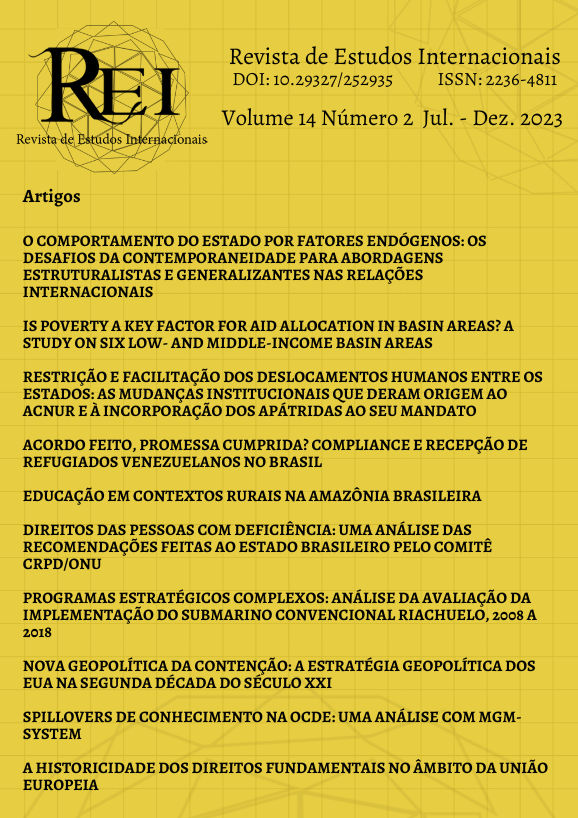O COMPORTAMENTO DO ESTADO POR FATORES ENDÓGENOS
OS DESAFIOS DA CONTEMPORANEIDADE PARA ABORDAGENS ESTRUTURALISTAS E GENERALIZANTES NAS RELAÇÕES INTERNACIONAIS
DOI:
https://doi.org/10.29327/2293200.14.2-1Palavras-chave:
Teoria das Relações Internacionais, Construtivismo, Behaviorismo, Política Externa dos Estados UnidosResumo
O artigo trabalha um Estudo de Caso sobre o impacto do Lobby Israel na formulação da Política Externa dos Estados Unidos, debatendo a nova revolução behaviorista. A pesquisa investiga falhas de teorias restritas a explicar alterações de interesses por fatores estruturais. Desta maneira, é sinalizado que analisar fenômenos complexos por uma única lente, limitada a certos elementos, restringe e afeta a compreensão sobre o comportamento dos Estados na contemporaneidade.
Referências
ADLER, Emanuel. (1999). O construtivismo no estudo das relações internacionais. Lua Nova: revista de cultura e política, 1, (47): 201-246
ANGELL, Norman. (ed.). (2002). A Grande Ilusão. Brasília: Editora Universal de Brası́lia.
AYOOB, Mohammed. (2002). Inequality and Theorizing in International Relations: The Case of Subaltern Realism. International StudiesReview. 4, (3): 27-48.
CARR, Edward H. (ed.). (2001). Vinte anos de crise, 1919-1939. Brasília: Editora Universal de Brası́lia.
CRAVINHO, João G. (ed.). (2006). Visões do Mundo. Lisboa: Imprensa de Ciências Sociais.
HACKETT, James, organizador. (2022). The Military Balance. 2022. Routledge ; The International Institute for Strategic Studies, 1 (1): 320-328
HAFNER-BURTON, Emilie M., et al. (2017). The behavioral revolution and international relations. International Organization, 71, (1): 1-31.
HERZ, John H. (2003). The security dilemma in international relations: background and present problems. International Relations, 17, (4): 411-416.
GERRING, John. (2004). What is a case study and what is it good for?. American political science review, 98, (2): 341-354.
HOBSON, John M.; LAWSON, George. (2008). What is history in international relations?. Millennium, 37, (2): 415-435.
KANT, Immanuel. (ed.). (1989). A paz perpétua. Porto Alegre: L&PM.
KEOHANE, Robert; NYE, Joseph. (ed.). (2012). Power and Interdependence. USA: Longman.
KING, Gary; KEOHANE, Robert; VERBA, Sidney. (ed.). (1994). Designing Social Inquiry. Princenton, Princenton University Press.
LAKE, David A. (2009). Open Economy Politics: A Critical Review. Review of International Organization, 4, (1): 219-244.
MEARSHEIMER, John J.; WALT, Stephen. (2006). The Israel Lobby. London Review of Books, 28, (6): 3-12.
MEARSHEIMER, John J. (2014). The tragedy of great power politics. Updated edition. New. York: W. W. Norton & Company.
MORGENTHAU, Hans. (ed.). (2003). A política entre as Nações. Brasília: Editora Universal de Brasília.
PEREIRA, Marta R. F. (2020). De Washington DC a Telavive a Riade: As relações entre os Estados Unidos da América, Arábia Saudita e Israel. Dissertação de Mestrado, apresentada à Faculdade de Ciências Sociais e Humanas da Universidade Nova de Lisboa (Orientador: Prof. Dr. Marco Lisi)
PRICHARD, Alex. (2012). Anarchy, anarchism and international relations. In. KINNA, Ruth. (ed.). The Continuum Companion to Anarchism. New York: Bloomsbury Publishing USA.
ROSA, Luiz Pinguelli. (2006). Tecnociências e Humanidades: novos paradigmas, velhas questões. São Paulo: Paz e Terra.
SÁTYRO, Natália G.; D'ALBUQUERQUE, Raquel W. (2020) O que é um Estudo de Caso e quais as suas potencialidades. Sociedade e Cultura, 23, (1): 1-33.
SIDDIQUI, Ismail. (2020). A Behavioural Approach to International Relations: The Case of China. Social Science Research Network, 1 (1): 1-5.
STUCH, Peter; ELIAS, Juanita. (2007). The Nature of International Relations. London and New York: Taylor & Francis Groups.
SCHENONI, Luis; ESCUDÉ, Carlos. (2016). Peripheral realism revisited. Revista Brasileira de Política Internacional, 59 (1): 1-18.
WALTZ, Kenneth. (ed.). (2002). Teoria das Relações Internacionais. Lisboa: Gradiva.


